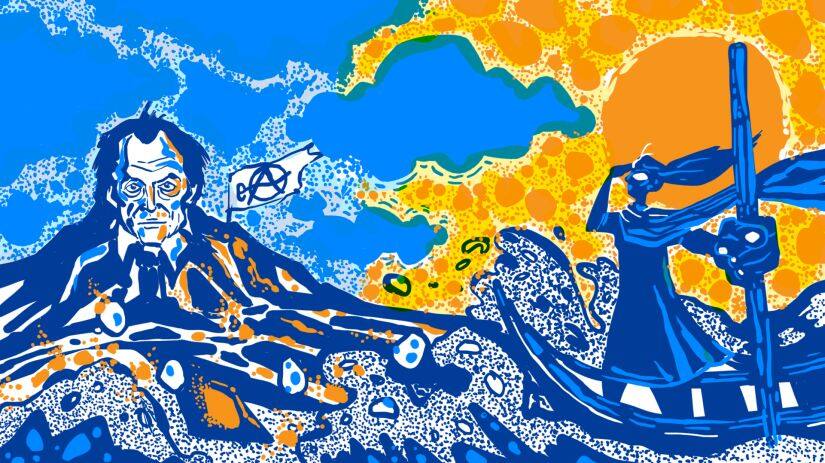Editor’s note: What does it mean to be ‘mentally ill’? In this weekly column, Sneha Rajaram writes about navigating through a ‘mentally ill’ life — encompassing aspects that are both everyday (medications, rights) and contemplative (the universality of suffering) I recently came across the phrase “experiential anarchy”, used by the unconventional twentieth-century psychiatrist RD Laing to describe, as I understand it, a society in which personal experiences of different kinds are all considered valid. When I googled this, I found a talk given by Dr Laing in which he says: We declare what you might call ‘experiential’ anarchy. I have no designs on trying to stop and start how anyone experiences the world. … I have no designs on controlling, manipulating or dominating that person, to lay down the law and say what is the case and what is not the case, then to re-enforce this with a system of rewards and punishments. It’s easy to see how Laing was considered a voice in the anti-psychiatry movement, which validated the experiences of schizophrenia and politicised its diagnosis, among other things. A concept like “experiential anarchy” could have infinite value for those of us who have been diagnosed with mental illness. [caption id=“attachment_5100861” align=“alignnone” width=“825”]  Illustration by Satwick Gade[/caption] Because psychiatry as a practice does both harm and good. One of its crushing (conscious or unconscious) agendas seems to be to invalidate our experiences by pathologising and ab-normalising them. And I worry that, in our gratitude to psychiatry for what it’s done to acknowledge and mitigate our pain, we forget its dark side. It seems we psychiatric patients (or almost-psychiatric-patients) either focus too much on politicising psychiatry at our own personal expense, or individualise our experience and health so much that we are bamboozled by the labels and stigmata that are slapped on us. Any social community, movement or struggle must find a balance between personal well-being/survival and political perspective. Otherwise, it risks either burnout/death or being duped by the powers that be. And like it or not, we’ve been grouped together as a community – of “NIMHANS gone-cases”, as we’d say in my Bangalore childhood. Inevitably, for me, psychiatry is a world of half-truths. It can be neither wholly digested nor wholly dismissed. It is easy to disagree with its assessment of schizophrenics as being out of touch with “reality” – yet impossible to deny that mania, delusions and hallucinations can be dangerous, even fatal, to the perceiver and his/her surroundings, and that controlling someone can be necessary. Psychiatry’s biochemical blueprint for addiction seems dehumanisingly deterministic – yet it is far kinder than society’s moralistic one. I cannot agree with its reduction of my depression to a matter of serotonin – yet medication has given me relief year after year. And so on. The medication itself contains a similar trade-off – side effects and shame versus relief and functionality. Psychology does too – no one wants to be reduced to their childhood experiences or find out that they have the same predictable response to trauma as everyone else, but knowing where our thoughts and feelings are coming from can be surprisingly liberating, if we can get over how infra dig it is. We may feel that we have to pick a side. We may feel that we have to choose between externalisation and internalisation, pathos and pathology. We don’t. Even with a choice as clear-cut as medication, many of us will go on and off it in cycles throughout our lives. We are people with complex minds moving through time, so we can take advantage of grey zones, spectrums and cycles. The zeitgeist, however, doesn’t have the same luxury. It exists only in the moment; it must lean in one direction or the other. If the zeitgeist of the anti-psychiatry movement in RD Laing’s time (the 1960s and 70s especially) leaned towards rejecting the psychiatric model, the millennial zeitgeist – of which I am very much a product – leans towards personal well-being. More and more people are finding a voice, a space, a language to talk about their mental health. We’ve created “safe spaces” where, finally, trauma has grown a tongue. Our inner worlds are acknowledged and validated to a remarkable degree. The world, too, hears our stories more often. We wield our diagnoses and labels with a little more flexibility. We are reaching for our individual happinesses, however far away. We are each speaking our truth. For me though, in a world of half-truths, this overdue millennial trend can still only be half the truth. I find myself asking questions like: in our eagerness to support each other as a community, are we becoming too insular in our thinking? Are we failing to connect the crucial dots between trauma and social oppression? Are we forgetting our autistic siblings? The mentally differently abled? Are we allowing ourselves to be over-pathologised by diagnoses instead of using them for validation? Are we using medication actively, in order to live the lives we want? Or are we using it passively – as an anodyne? (I am a very passive user.) Has our narrative overtaken our experience? Most of all: are we able to empathise with those whose experiences are different from ours – diagnosed or undiagnosed, functional or dysfunctional, happy or unhappy? In short, are we truly allowing ourselves “experiential anarchy”? _Read more from this series here _
Any social community, movement or struggle must find a balance between personal well-being/survival and political perspective. Otherwise, it risks either burnout/death or being duped by the powers that be.
Advertisement
End of Article


)
)
)
)
)
)
)
)
)



